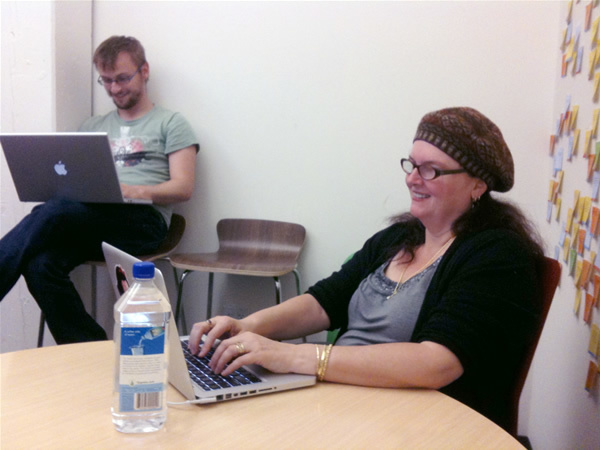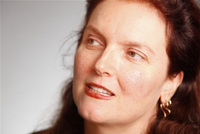When Brion Vibber stepped down as the chief technology officer at Wikimedia Foundation, he left large footprints to fill. Wikimedia is the organization behind Wikipedia and several other collaborative websites, and Vibber was not only its first and only CTO, but the lead developer behind MediaWiki, the organization’s popular open source wiki software engine.
At first glance, Vibber’s successor seemed an unlikely choice. Danese Cooper majored in French literature at the University of California, Los Angeles, with far more work experience at the corporate level than with non-profit organizations like Wikimedia. Cooper grew up in the Palos Verdes Peninsula on the southwest tip of metropolitan Los Angeles, After graduating college, she did volunteer work overseas, then got hired by Apple as an electronic document specialist. She worked for Microsoft for six months before concluding that the company’s idea of business ethics didn’t match her own. Returning to Apple, she moved into product testing and became an engineering manager. The most relevant experience for her current job commenced in 1999, when Cooper led open source projects--first at Intel, then at Sun. She moved to a startup in 2009 and joined Wikimedia Foundation last January.
As CTO jobs go, Cooper’s is unique. Wikipedia is among the 10 most popular destinations on the Web, as well as one of the most global: with 262 language editions, 24 of which feature more than 100,000 articles. (The Japanese wiki is the fifth largest, after English, German, French and Polish.) The project has no advertising, hosts 16 million articles, and almost as many behind-the-scenes debates. As somebody once wrote about the project: Wikipedia doesn’t work in theory, only in practice.
That Wikipedia does work reflects well not only on its thousands of contributors, but its technology--which has helped define what a collaborative online environment should look like and what it can accomplish. Cooper is now entrusted with that technology’s care and feeding. Not that she’s complaining. After a career in the heart of the Silicon Valley profit sector, she calls her new post “the perfect job for me.”
- Majoring in French literature doesn’
t sound like a career path to computer science. How did you get there? I went to an incredible secondary school in the 70s, where I learned BASIC--so I wasn’t afraid of programming, and I had the mental model. And even though my degree was in French literature, all the prizes that I got in high school were in biology.
- When did you make the transition to coding?
The best way to learn a new language, including a coding language, is to date somebody who already speaks it. While I was at Apple, I met someone who was an incredible programmer, and he taught me. We are now married.
- You’ve worked for some of the best known companies in American technology. What was it like moving to a non-profit?
I had worked for a couple of non-profits long before I ever worked for Apple. And right out of school, I joined the U.
S. Peace Corp. I had wanted to teach kids in Appalachia how to read, but I had a degree in French, which meant that I was going overseas. So I went to Morocco. If you want to talk about living on no money and trying to effect global change one person at a time, that’s what the Peace Corp is all about. - You’ve written that you were surprised to learn that you are now the only female CTO at the top 10 websites. You’ve also spoken about gender inequality in open source.
A 2002 survey of open source contributors by Maastrich University reported that only about one percent were women. That troubled a lot of us who are women and happen to work in open source. There have been various attempts to remedy that problem: by awareness, by evangelism, by providing platforms for women to meet and talk. I speak pretty regularly at an all-women’s conference called She’s Geeky. Every year, I encounter women there who are just on the edge of being able to get up the nerve to stick their necks out. A curious thing happens to women in technology when they stick their necks out: we attract a lot of attention and a lot of hate mail.
- What do you mean?
Open source is about being visible―much more visible than you are working behind the “firewall” of a company. Being visible means that some percentage of the human population thinks you are a fair target. So one of the reasons that there aren’t more women in open source is that they tend to get scared away because people pick on them. I’m not necessarily talking about other open source developers―the perpetrators are often random trolls. But there are women, including Mitchell Baker [chairwoman of Mozilla] and Allison Randall [technical architect at Ubuntu], who are willing to stick their neck out and take a few potshots. Even so, it’s still really hard to recruit women into open source. But we’re working on it.
- You’ve been at Wikimedia foundation for almost a year. What’s your role?
“CTO” is a title that gets used different ways in different companies. At Wikimedia, I am mostly reforming, reorganizing, and reworking the way we engineer stuff, in part because we have gotten into some bad habits, but also because we want to scale better. We’ve also had too many instances where only one person, literally, knew how to do something. Simultaneously we are creating a new primary data center in a tier 1 facility. God loves Wikimedia: we know that because a hurricane hasn’t yet hit Tampa. Everything we care about lives on a single floor in Tampa. It’s secure in the sense that random ninjas couldn’t go in there and slash our servers. But this is an office building in a city where there is lots of hurricane activity, which means it doesn’t have super good peering opportunities. There aren’t a lot of other clients of this little company where we are hosted that have good connections to the international telco network. In other words, given that we are one of the the top websites in the world, we are hosted in the wrong place.
- Given the total hours that have been put into Wikipedia, I find this terrifying.
It scares most people when we talk about it. Let me reassure you that the data itself is pretty well backed up everywhere. Even the historical data has been dumped for researchers. The problem is our entire configuration: if Tampa got knocked out tomorrow, it would take us a couple of months to be functional again as an engineering organization. We might get Wikipedia up faster than that, but you probably wouldn’t be able to edit for a while. After we get this new primary data center online, we will never only have one data center again. There will always be at least two geographically diverse centers, so that if something were to happen to our primary one, we could sail over it to the secondary.
- Wikimedia Foundation’s best known open source project is MediaWiki, the engine powering Wikipedia. What’s its status?
Every conference I attend, somebody comes and asks me some esoteric question about Mediawiki--apparently mistaking me for Brion Vibber, because we look so much alike. He was the lead developer on the project and knows more about the software’s internals than I’m ever going to know. But we do have plans for the engine. We are going to commit to more regular releases, which will make people happy. We are looking to create a version where the core set of extensions doesn’t have to be configured. We would like to convert the “m.
dot” mobile version to a more supportable platform, and make it so that regular people can configure and use it. We are also thinking longer term about Mediawiki--getting it ready for the next decade or so. - How big is your in-house team?
When I walked in the door, we were running the fifth largest website in the world just four and half full-time ops [operations] people, and one of them was a volunteer. That’s just insane. That means that anytime anything breaks, all four of those guys have to get on an IRC channel. So this coming year, we’re at least trying to fix that problem by adding a couple more people in operations. In terms of our broader staff, we effectively have the services of about 25 people, including both paid employees and contractors, plus some interns. We plan to expand over the coming year.
- What’s going on with the project in Japan?
We have a number of people in Japan involved with localizing Mediawiki tools, but they tend to deliver the work over the wall, fully formed. It’s almost as if they don’t understand how open source works. Here’s what I mean. Say we’ve just released a new feature that the German developers have localized. They contact us and have a conversation with the engineer who wrote that feature. They’ll say: “We are making these modifications to make the feature work for us--but what effect will those modifications have?” They’ll have this discussion before they’re finished coding--so that their version doesn’t just get thrown at us, fully formed.
- Why do you think this problem is arising particularly in Japan?
I’m saying this as an open source activist, not a Wikimedia person: perhaps the reason is cultural. I think Japanese programmers probably like to put their absolutely best work out there. But that’s not an open source value. We send code out all the time with notes attached saying “I know this section is ugly, but it’s just a placeholder.” That approach is more conducive to having a conversation because the coding hours haven’t yet been put in.
The other problem might be language. Japanese programmers mostly aren’t comfortable communicating in English, and we certainly aren’t capable of communicating in Japanese. That’s a problem not only for dialogue, but for comments in the code. The good news is that we have some members who are pretty good at translating back and forth, so a mediated dialogue does seem possible down the road.
This is all very important to us. We want to support as many countries and languages as possible. We’re not the only ones, of course: Mozilla and Ubuntu are two great examples of truly global localization efforts. That’s the wave of the future. It’s why the OpenOffice project was so important. This is about going beyond the just the languages of commerce. We should be looking more broadly than that. True localization means that people shouldn’t have to learn a new language in order to use a computer--or, for that matter, to be able to access human knowledge.




